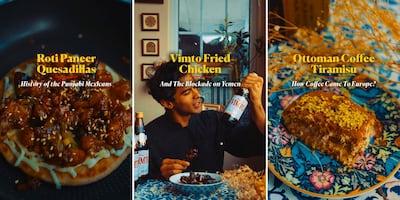Nadir Nahdi sizzles Vimto-fried chicken as he talks about the blockade of Yemen. He puts together a paneer quesadilla while folding in the story of Punjabi-Mexicans. He tosses jollof rice warak enab with black bean hummus as he recounts the history of the Lebanese in West Africa.
Dubbed “Brown Bourdain”, Nahdi believes that – if you care to listen – food tells a story.
Presently, Nahdi is making a name for himself in Dubai society, calling the foodie-friendly city his second home. However, as a part Indonesian, Yemeni, Pakistani and Kenyan boy raised in London, Nahdi approaches the complex layers of the backstories of countries through their food, and his recipe videos are served alongside montages of historical footage.
Food for thought

“The by-product of capitalism over the last 200 years is that everyone is disassociated with produce and how it pertains to who we are,” says Nahdi, who is in his early 30s. “Over time, there has been a disconnect with the foods we eat and the stories behind them.”
content creator
Much like his ancestry, Nahdi’s content on social media (followed by 420,000 across Instagram, TikTok and YouTube) is infused with the vastness of continents and culture thanks to his mixed-race grandparents.
Born in London, Nahdi had a diverse upbringing. “At home, we’re very culturally unique and we bring all those things together to make something that’s innate to us.”
The filmmaker says no amount of training or even learning from a chef will give you that secret ingredient to success. He uses the Arabic word “nafas” to explain why one’s grandma’s food is perhaps the best in the world. “Nafas means breath, but when someone cooks with nafas, it means they breathe life into the food.”

He wishes to someday bequeath to his children his family’s culture through food. He says that it is vital for the current generation to learn their ancestral dishes, otherwise the stories sitting in the background of these recipes will slip away.
Nahdi cites coffee as an example, pointing out that most people aren’t aware that the beverage originates in Yemen and Ethiopia. While sprinkling cut pistachios over Turkish coffee tiramisu, he layers the video with the Muslim history of coffee and how the West tried to get their hands on it.
“I think why I am telling the stories I'm telling is to make people understand that these are part of our cultural heritage and pride.”
He points out the intertwined legacy of coffee in the Indian subcontinent. “Colonialism took it there, but it also became part of Indian history. I think it's key for us to understand that produce has been sold back to us when, in fact, it has always been ours in the first place.”
Nadir believes the “evil of colonialism” is responsible for scores of formerly colonised people still lacking self-respect and feeling unworthy despite their deep legacy of incredible beverages, food and culture at large. “Once we understand these stories, we feel a lot more pride in who we are and what we've given to this world.”
Power of social media
When asked why the majority of people tend not to reflect on and learn from the past, Nahdi says he “cannot imagine living life accidentally”.
“That is why when we look back, we wonder: 'Where did life go?' Because we don’t really take time to think about it on a deeper level.”
Nahdi believes the internet needs more creators who use it for positive change. “We need more creative people who are deep and intellectual, and can bridge that gap between entertainment and education.”
Even so, the millennial is optimistic about social media’s ability to unite people in establishing a sense of justice. “For instance, I love seeing an empty Starbucks. I am so inspired by that. I love the power that we have in collective mobilising,” he says.
Mass calls for the boycott of American companies, including the coffee giant, have reverberated around the globe due to the continuing conflict in Gaza.
Conscientious consumerism

Nahdi's passion is not restricted to food, either. He is also focused on preserving culture through fashion. For instance, when The National met Nahdi during his panel discussion at the Emirates Airline Festival of Literature, he gestured to the colourful print on the shirt he had on, saying: “I'm wearing a Batik shirt right now, which is a wax-printed textile in Indonesia. These aren't random patterns; they mean something.”
As The Batik Guild website notes: “Batik reached its peak in Java. From 1835, textile manufacturers in the Netherlands attempted to mechanise production using copper rollers and a resin resist.
“Javanese textile merchants responded to the threat by finding a way to speed up the time-consuming method of hand-drawing the design. Wooden block printing was adapted to batik with the invention of copper stamps (or tjaps) to apply hot wax.
“Imitation batik cloth was produced in numerous European textile printing companies throughout the 20th century, most notably in the UK and the Netherlands, and [is now] made in just one – Vlisco in Helmond, the Netherlands – a reminder of a colonial past.”
An ambassador for conscious living, Nahdi says if the indigenous weavers of a fabric or style of apparel took the time to think about a garment on a certain level, then the wearer should also take time and attention to appreciate it at that level.
“The only thing that I think is really important in this day and age is more thoughtfulness in everything that we do, eat, partake in and wear because these things don't happen by accident.”

